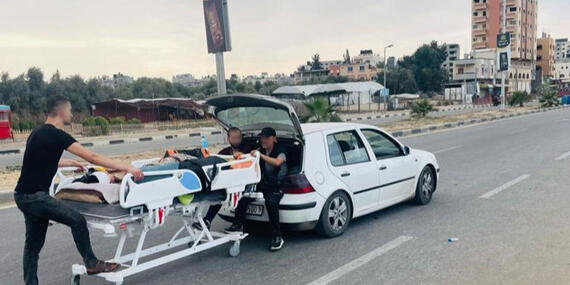Today's top news: Occupied Palestinian Territory, Sudan, Syria

Occupied Palestinian Territory
In Gaza, fighting around Al Shifa hospital intensified over the weekend, causing damage to the hospital’s water tanks, the oxygen station, the cardiovascular facility, and the maternity ward. Three nurses were reportedly killed.
The UN Office for the Coordination of Humanitarian Affairs reports that while some staff and patients managed to flee, others remain trapped inside, either too afraid to leave or unable to do so for medical reasons.
Hospitals and medical personnel are specifically protected under international humanitarian law. Any military operation around or within hospitals must take steps to spare and protect the patients, medical staff, and other civilians.
OCHA warns that lives in Gaza are hanging by a thread due to depleting fuel and medical supplies.
Yesterday, the Palestinian Red Crescent Society announced that Al Quds Hospital in Gaza City was no longer operational due to lack of fuel and power outages.
Martin Griffiths, the Emergency Relief Coordinator, said in a social media post that there can be no justification for acts of war in health care facilities. This is unconscionable, reprehensible and must stop.
Following the collapse of services and communications at hospitals in the north, the Ministry of Health in Gaza has not updated the casualty figures in Gaza since 10 November.
Gaza has been under electricity black out for over a month now.
Yesterday, 76 trucks carrying food, medicines, health supplies, bottled water, blankets, tents and hygiene products crossed from Egypt into Gaza. This brings the number of trucks that have entered Gaza since 21 October to 981.
Sudan
The Sudan Humanitarian Forum met for the first time today, convened by the Under-Secretary-General for Humanitarian Affairs Martin Griffiths and the Humanitarian Coordinator for Sudan, Clementine Nkweta-Salami.
During the meeting, Mr. Griffiths said the Forum is a critical opportunity to make progress towards relieving the suffering of the people of Sudan.
He urged concrete steps to protect civilians from the fighting and underscored that humanitarians need safe and unhindered access to everyone in need.
Representatives from the Sudanese Armed Forces (SAF) and Rapid Support Forces (RSF) participated in the virtual meeting, in line with their Statement of Commitments signed in Jeddah last week.
The co-facilitators of the second round of Jeddah talks were also represented: the Kingdom of Saudi Arabia, the United States, and the Intergovernmental Authority on Development, which also represented the African Union.
Syria
The Government of Syria has extended its permission for the United Nations to use Bab al-Salam and Al Ra'ee crossings to deliver humanitarian assistance across the border from Türkiye to north-west Syria for three months, until 13 February 2024.
The UN cross-border operation remains a lifeline to people in north-west Syria. Each month, the UN and partners reach an average of 2.5 million people with critical assistance and protection services.
So far this year, more than 4,200 trucks carrying UN aid have crossed from Türkiye to north-west Syria using the Bab Al-Hawa, Bab Al-Salam and Al Ra’ae border crossings. As of today, more than 260 cross-border missions by UN personnel have also been completed.
